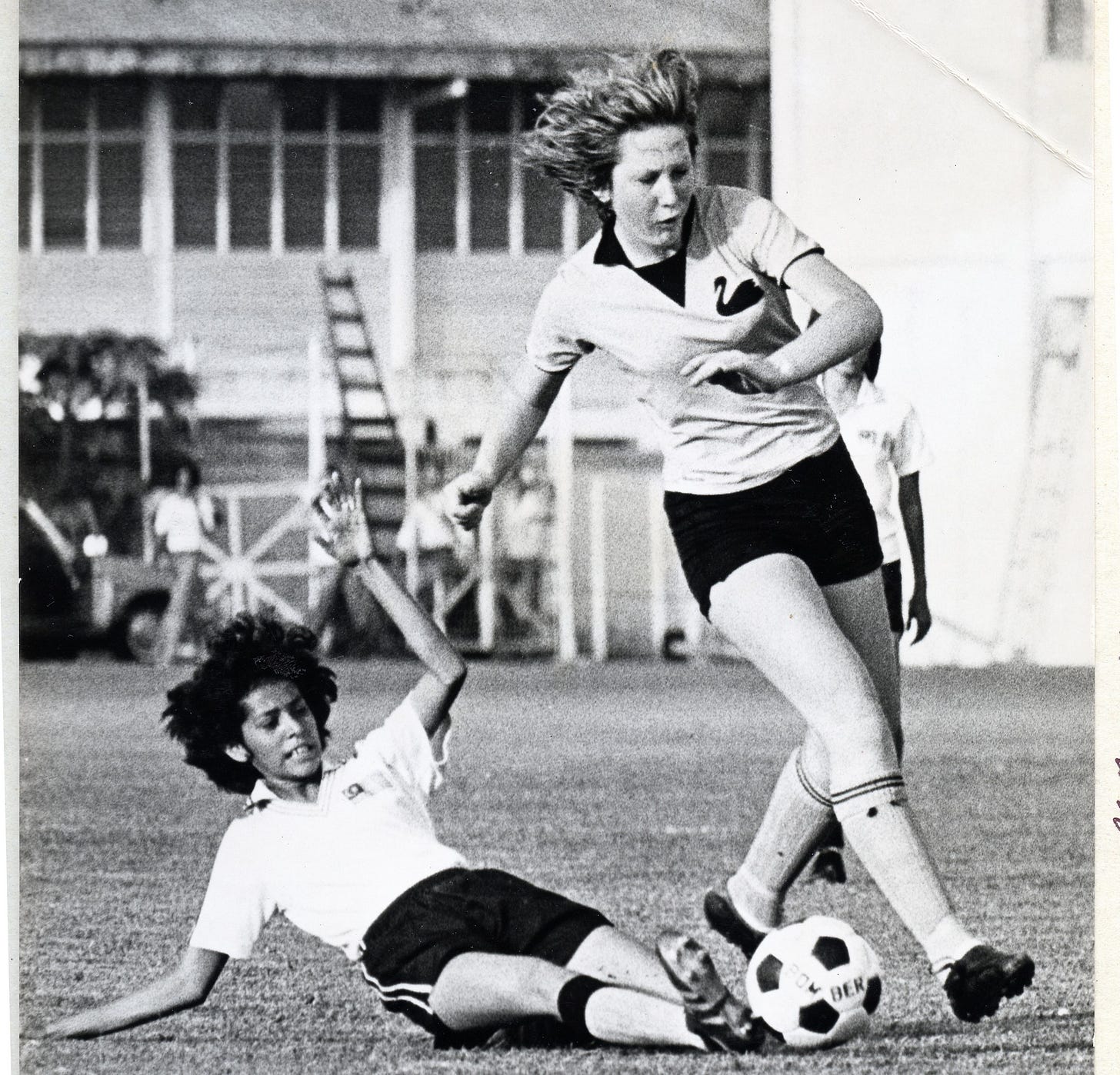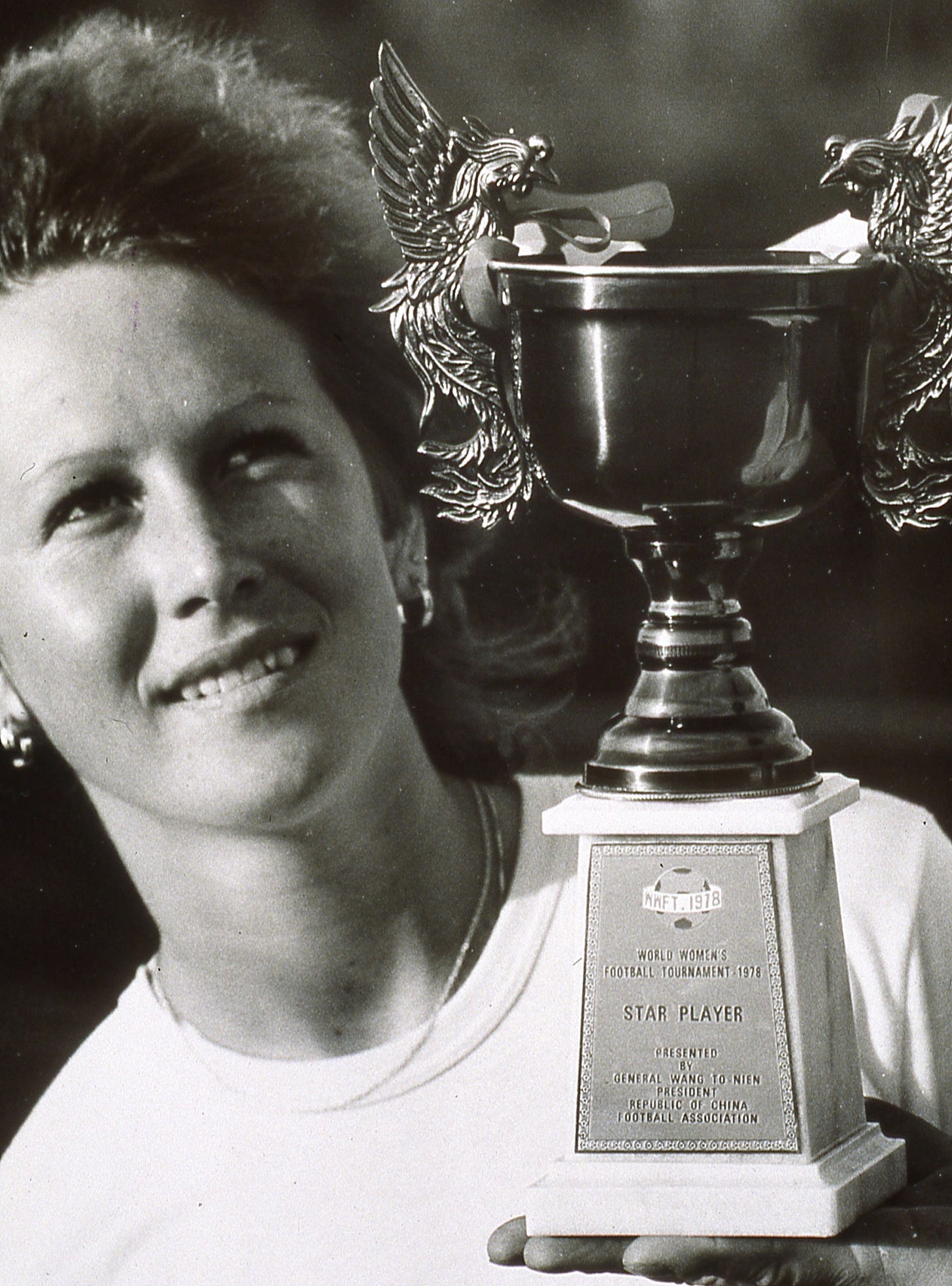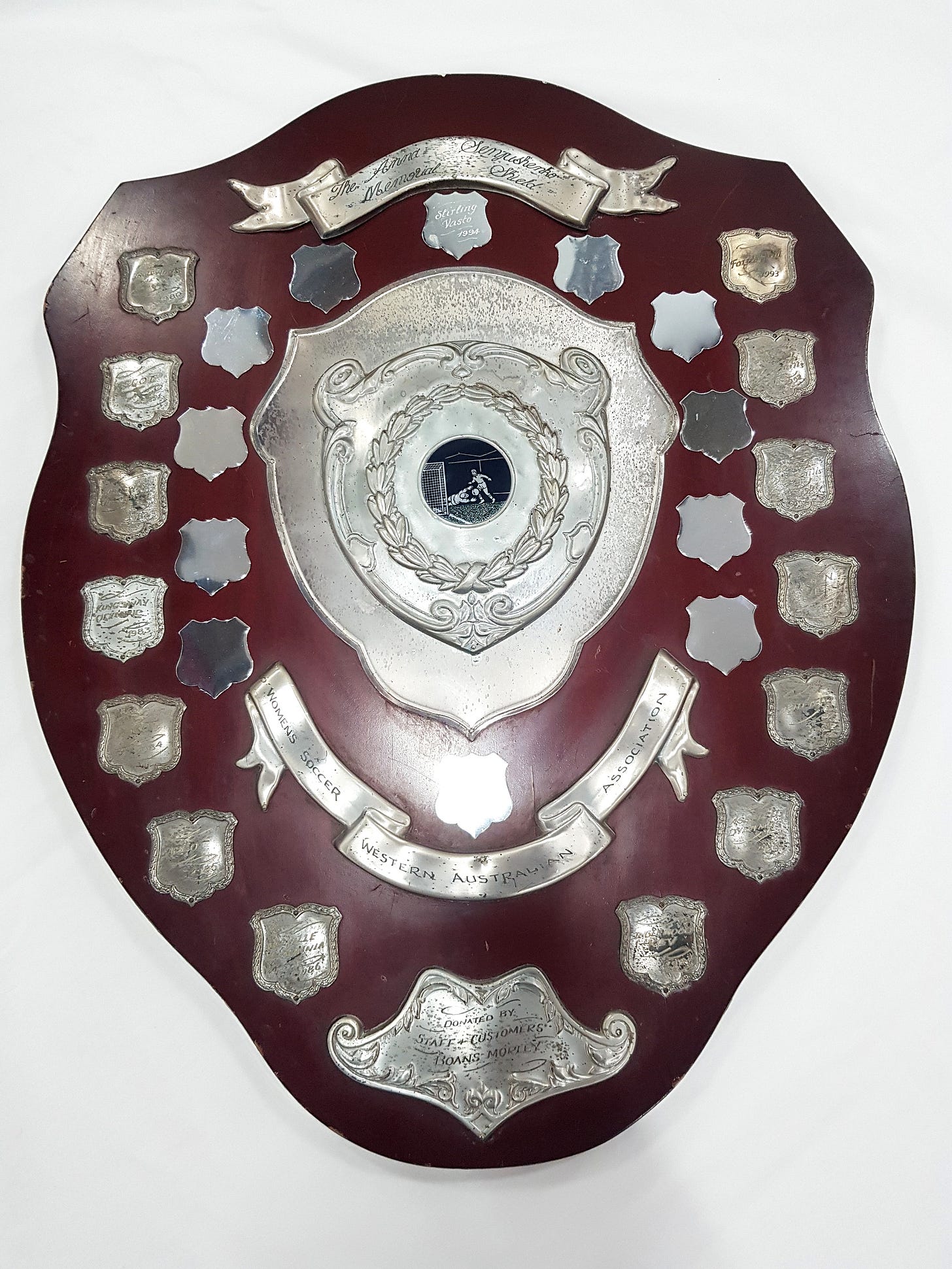The Story of Anna Senjuschenko, Australia's tragic lost talent
Anna Senjuschenko was a promising young footballer growing up in Perth, Australia in the 1970s and was heading right to the top when a tragic car accident took her life in 1979.
Finding accurate information about a footballer who played on the other side of the world and passed away in the 1970s is not easy, so before I delve into the story of Anna Senjuschenko, I want to thank the people who allowed me to put this tribute together ahead of England vs Australia on Tuesday night, and those who were so keen to remember Anna’s life and her talent as a young football player.
To the Australia Football Federation who put me in touch with Penny Tanner Hoath, a Western Australia Hall of Fame Committee Member. Penny couldn’t have been more helpful, putting me in contact with several of Anna’s former teammates, Sandra Brentnall and Jill Gray, plus others who knew Anna, who were also incredibly helpful through their memories of Anna as a friend and teammate
Sandra then put me in contact with a friend of Anna’s, Christine Madaschi, who through her Ukrainian sister-in-law put me in contact with Karl Kramer, the current Club Secretary at the club Anna once played for in Inglewood, and he then put me in contact with Brett Klucznik, another Hall of Fame Committee member in Western Australia and the person who provided in-depth, detailed notes about Anna’s career. Other teammates provided information, but wished not to be quoted.
Without word of mouth and the help of those named, this article wouldn’t be possible.
This is Anna Senjuschenko’s story.
Described as a “special breed”, Anna Senjuschenko had the world quite literally at her feet when she started playing close to home in Perth at the age of just 12 years old.
A tall, elegant defender, Senjuschenko was born on 16th September, 1961, after her parents migrated from Russia 11 years earlier.
Her older brother, Alex, who passed away in 2012 and was inducted into the Football Hall of Fame Western Australia in 2008, was born in Germany in 1950 and taught Anna to play football.
Their dad also played the game, so she was well versed in the sport from a young age.
The Western Australian Girls Soccer Association kicked off in 1972 after a year of gathering interest, and Senjuschenko was one of the first girls to become involved when she started playing a year later in 1973.
Alex started playing for local club Kiev, set up by two Ukrainian migrants in 1951, renamed to Inglewood in 1970. He too was a centre-back, the same position his younger sister would go on to make her own.
At the time, Kiev wore the colours of the Ukrainian flag and fielded a squad of players mainly with a Ukrainian or Russian background, such as the Senjuschenko’s.
Eventually settling on the name of the area of Perth the team was based (Inglewood United), Anna joined the club aged 12 and instantly stood out. A year previous, the inaugural women’s competition had started, with the first title won by Swan Athletic.
Check out over 100 more unique stories in WFC’s Premium section, available for just £45 for 12 months, paid in one go, or a £6 a month rolling subscription.
All subscriptions come with a 7-day free trial to allow you to explore our full archive.
Plus, guarantee you everything that is to come over the next 12 months…
Swan, Ascot and Perth Azzuri dominated the league, while Inglewood won promotion from the second division in 1975 and finished third in the top division in 1976, largely thanks to the presence of players like Anna.
Peter Dimopoulos, a Greek migrant and one of the men credited with helping to kick-start the women’s game in Australia, would become the State team head coach and called Anna up to the squad for the National Championships in 1976, aged just 15, alongside Jenny Senjuschenko, her sister-in-law.
A year later, she was called up again, with Jenny this time playing against her for Queensland, and her performances brought her to the attention of Jim Selby, the national team head coach at the time.
She was selected in a squad of 24 to go to Hong Kong for the Euro-Asia Cup, but the tournament never materialised. Back home though she was flying and growing on the radar in not just Australia, but around the world.
She was awarded Youth of the Year by the local Bayswater Council and was part of the State team which toured Malaysia and Singapore, before she would return to Asia in 1978 for the first Women’s World Invitational Tournament in Taipei, an unofficial World Cup and a pre-cursor to the real thing in 1991.
With Australia the only formal national team as other countries sent club sides to represent their nations, Anna played four games against Union SC Landhaus (Austria), Dallas Sting (USA), Hackas IF (Finland) and a Denmark Select XI.
After winning the National Championships a month earlier with her State team, it was a breakout period for a player who had just turned 17, voted Star Player of the Tournament by the media and also selected in the World XI team.
Senjuschenko had it all going for her and received offers to go and play in the USA, which she turned down due to her age, but she was going places and quick.
One of half a dozen players from Western Australia who were part of the squad, including Brentnall and Kozak, Anna also started playing netball and softball at State level, before fate intervened.
In 1979, Senjuschenko had been at a quiz night fundraiser with her State team to raise money for their trip to the latest National Championships in the north of the country in Darwin.
The rest, back home in Australia at least, is well-known, and still leaves scars to this day.
Anna was travelling home from the event and was the passenger in a car which was involved in a fatal accident, tragically taking the life of one of the nation’s brightest young footballers
The memories of those who remember her are sketchy, understandable given both the tragic circumstances and the fact it was almost half a century ago, but the memories of the night itself are common among those who were there, such was the scale of the tragedy.
Her legacy still lives on in the country and certainly in Western Australia, where she called home. Until 2005, the local State Shield, before it was disbanded, was renamed the Anna Senjuschenko Memorial Shield and was played for every year.
“I’m on the Football Hall of Fame Western Australia committee and we still have the shield in our store,” says Tanner Hoath, who has been involved in setting up a museum to exhibit such trophies ahead of Australia co-hosting the World Cup this summer.
One teammate, who had been at the same fundraiser event, recalls staying overnight at a friend’s house after the event and travelled to a game the day later in the car together.
A breaking news alert came on the radio to say a young girl had been killed in a car accident the night before. With more detail emerging, the name then came over the radio and stepped everyone in their tracks.
The name was Anna Senjuschenko.
When they arrived at the ground, the news was confirmed and she describes the “hardest part” as going on to play the National Championships in Darwin without Anna.
At Anna’s funeral, just one week before the event in Darwin, everyone wore State tracksuits and formed a guard of honour as her coffin came into the church.
She says “it changed us all for a long time”, while former teammate Brentnall says the accident “destroyed the family”, brother Alex in particular.
“I only knew Anna as a teammate,” recalls Brentnall. “I know she was also a State Softball player. We were all so young.
“Her only brother Alex adored her. They were very close, he helped to coach us. She was a strong defender who read the game well, had the ability to move forward, creating attacking moves as well as being great in the air.
“She was a team player. Good at heading, tackling, she was quick off the mark, able to dribble past players with ease. She was always friendly away from the pitch, always smiling and laughing.”
Another former teammate, Jill Gray, was also driving to the event the next day when news of Anna’s death broke, and she too remembers it all too well.
Like Brentnall, she also recalls “fond memories of her great sense of humour and her boisterous laugh”, a common trait among those who remember her.
“I also remember even though she was only 17 years old, when I knew her she was an imposing figure on the field,” says Gray.
“She was tall and solid and reasonably fast. Fantastic with anything in the air. She was a great team member and was liked by everyone.”
Her last recollection too is the previous night’s fundraising event, where she recalls speaking to Anna. It was also the night of Gray’s 21st birthday.
“The following morning myself and three friends were driving to our club game when an announcement came over the radio which stated Anna had been killed in a traffic accident. We were all in complete shock and couldn’t believe what we had just heard.” she recalls.
A local politician, now in her seventies, also recalls the night vividly.
“The night before was the State Team Fundraiser Quiz night and whilst Inglewood were dominant on the pitch, often smashing more social and less skilled teams in their division and rubbing it in under friendly fire, UWA were the Quiz Queens.
“UWA always took the opportunity to rub it in at the annual quiz nights, with jibes and jokes. The Quiz Night masters usually won by a landslide and took their only opportunity to get one over the Inglewood team.
“But the following day, match day, the news of Anna’s death on arrival to the pitch, brought everyone together in that shock. Being a small competition, that was the infancy of women’s soccer, everyone knew Anna and she was especially well liked by everyone that knew her. Their match was postponed as I suspect others were that day.”
Just a year later, Kiev won the league title for the first time and dedicated their success to Anna.
In 1996, she was the first player ever to be inducted into the Football Hall of Fame Western Australia where she and other inductees are not forgotten.
Run now by Kramer, the Kiev club still exists under the guise of Inglewood United, where too Anna is constantly remembered, and her name has been written about in books and websites back home, but rarely beyond.
Boans Morley, the department store Anna worked at around playing sport, donated the trophy which was created for the annual Anna Senjuschenko Memorial Shield, and it still resides in Western Australia to this day, as do the memories of her life, career, and tragically, what could have been.




